Goldenhand Read online
Page 6
Lirael lifted the spear high, and drove it down at the creature’s chest. She wasn’t sure what she’d expected, but it wasn’t for the thistle-point to enter the Hrule’s body almost without resistance. The crocodilian hide that could turn swords and Ancelstierran bullets simply parted, and the thistle went deep into the creature’s flesh.
The spear-shaft quivered for a moment, then it gently puffed away, turning into dust so that her fingers clutched at empty air. The dust fell in a tight cloud upon the Hrule, and where it fell, the tough hide and the flesh beneath became like water, which sank into the ground. Soon there was nothing left, not even a stain upon the earth.
“How did you know to bring a thistle?” asked Nick, his voice wavering as he tried to get up or just roll onto his side. Lirael went to him and put her hand on his chest, gently pressing him back down.
“I didn’t. I arrived an hour ago, in answer to a rather confused message from the Magistrix at Wyverley. I expected merely to cross here, not to find one of the rarest of all Free Magic creatures. And . . . and you. I bound your wounds and put some healing charms upon you, and then I went to find a thistle.”
“I’m glad it was you,” said Nick. He was already feverish, Lirael thought. She looked down, letting her hair fall across her face again, and felt the pulse in his neck, trying to act as unconcerned as possible. Intent on the healing, making sure all was correct.
“It’s lucky I read a lot of bestiaries when I was younger,” said Lirael conversationally. She paused, wondering what she could talk about. She looked over at the approaching Ancelstierrans and then across to her own guards, who were lining themselves up about twenty yards away. Captain Anlow was closest, trying to attract Lirael’s attention. She waved at them to go back. They did retreat a little, but stopped as soon as Lirael turned away.
The last star-shell fizzled out as Lirael looked back at Nick. She found it easier to talk to him in the dark. The Ancelstierrans would arrive shortly, and she presumed they would take him away again.
“I’m not sure even Sabriel would know about the peculiar nature of the Hrule.”
That sounded too much like boasting, Lirael suddenly thought. She stood up, a little flustered, and continued.
“Well, I’d best be on my way. There are stretcher-bearers waiting to come over to take you in. I think you’ll be all right now. There’s no lasting damage. Nothing from the Hrule, I mean. No new lasting effects, that is . . . I really do have to get going. Apparently there’s some Dead thing or other farther south—the message wasn’t clear . . .”
Lirael stopped talking and didn’t exactly bite her lip, but rather gripped it with her teeth in an agony of embarrassment. She’d just spouted a lot of nonsense. Nick would think she was a fool, since obviously he’d sent the message and the creature mentioned in the telegram was the Hrule, and it was dealt with and she wished she had never come, except that if she hadn’t Nick would probably have died and the Hrule would have done who knew what—
“That was the creature,” said Nick, but it wasn’t in the tone of voice of someone pointing out the blindingly obvious. “I sent a message to the Magistrix. I followed the creature all the way here from Dorrance Hall.”
“Then I can go back to the guards who escorted me here,” Lirael said. She gestured behind her, oblivious to the fact that Anlow and the whole company of Guards were sneaking forward again like guilty children. “They won’t have started back for Barhedrin yet. That’s where I left my paperwing. I can fly by myself now. I mean, I’m still—”
“I don’t want to go back to Ancelstierre,” Nick burst out. He tried to sit up and this time succeeded. Lirael reached out to help him, and touched his arm for a moment before immediately letting go. She felt foolish again, because of course he was just a wounded man who needed help; there was nothing about the touching that was anything else.
“I want to come to the Old Kingdom,” said Nick. He looked up at Lirael, but she looked away, toward the approaching Ancelstierrans. They were following a zigzag lane through the wire and somebody was shouting very officiously, though she couldn’t make out the words.
“I want to come to the Old Kingdom,” repeated Nick.
“But you didn’t come before,” said Lirael. She still didn’t look at him. “When we left and Sabriel said you should because of what . . . because of what had happened to you. I wondered . . . that is, Sam thought later, perhaps you didn’t want to . . . that is, you needed to stay in Ancelstierre for some person, I mean reason—”
“No,” said Nick. “There is nothing for me in Ancelstierre. I was afraid, that’s all.”
“Afraid?” asked Lirael. She did look at him, but hesitantly, half-hiding behind the hair that fell across her face, as she had used to do back in the Glacier. “Afraid of what?”
“I don’t know,” said Nick. He smiled again, a hesitant smile, seeking her approval. “Can you give me a hand to get up? Oh, your hand! Sam really did make a new one for you!”
Lirael flexed the fingers on her golden, Charter-spelled hand, and once again regretted Sam’s desire to show off his work. Her hand was glowing like a candle, soft behind gold-colored glass. It was warm, and charming, but just too visible for her liking. There and then she decided the spell would go, whether it hurt Sam’s feelings or not.
Nick held up his hands, one still bloody. He seemed confident she would take them.
“I’ve had it for only a week,” said Lirael, slowly turning her golden hand, opening and closing her fist. “And I don’t think it will work very far south of here. Sam really is a most useful nephew . . .”
Lirael looked directly at Nick this time. He was still holding up his hands. She knew if she reached out to them, she would be beginning something, making herself vulnerable, open to more hurt. If she took his hands, and he came to the Old Kingdom, what would happen? Or not happen, which might be even worse . . .
She wished the Disreputable Dog was there, to help her understand her own feelings, and to offer comfort if once again she found herself alone among all the other people who seemed to instinctively just know how to make friends and find lovers—
Focus, Lirael told herself. One step at a time.
“Do you think you can walk?”
“If you help me,” said Nick.
Lirael leaned forward, and their hands joined, just as the Ancelstierrans arrived and Lirael’s guards closed in, Captain Anlow gesturing so they spread out in a wide crescent about the Abhorsen-in-Waiting they were there to protect.
With a distant boom another star-shell blossomed high above, casting its harsh light across the barren landscape as it slowly drifted down on its silken parachute.
The sudden illumination was accompanied by more shouting. It came from a tall, remarkably slender, and very pallid Ancelstierran general. He was so pale that for a moment Lirael almost reached for a bell, thinking he must actually be a Dead creature, even though she had not felt the presence of such a thing.
But he was alive. Alive and protesting.
The general wasn’t wearing a helmet or hat, his completely bald head white under the flare. Nor was he wearing khaki and mail like the others; he had on a swallow-tailed coat of scarlet with many miniature medals on his breast, though a keen observer would note none of them were for valor or wartime service. His black trousers had a broad red stripe down the sides, and his dress shoes were very much the worse for crossing the mud and debris of no-man’s-land. He looked extremely out of place compared with the other Perimeter troops.
“That’s him!” cried the pale general, pointing at Nick. “Arrest him at once! And get these other people out of here!”
Chapter Seven
FISH ARE MORE IMPORTANT
At Sea, near the Mouth of the Greenwash
The raft of reeds slowed as the river lost its frantic pace, the spinning and rocking giving way to a gentler movement as the makeshift vessel moved out into the mouth of the Greenwash and began to simply ride up and down with the long ocean
swell. It was relatively calm, the sky clear with the promise of a fine spring day ahead, once the sun deigned to lift itself above the horizon. Though still very cold, it had stopped snowing hours before as the clouds departed.
The unnatural fire in the small pot continued to burn, and the black smoke continued to climb and drift. It would be visible from some distance now, a dark wavering line drawn vertically against the pale predawn sky.
Ferin slept on. Worn out from her journey, pursued and hunted most of the way, she would have been hard to wake even before she was wounded as well. With the shock from that on top of her general exhaustion, her body had retreated into a very deep sleep indeed, almost a coma. The transition from swirling river currents to the slow rise and fall of the sea had not impinged in the slightest upon her, though in the mountains she prided herself on being alert at all times, and it was true she would usually wake at the slightest noise or a change of light or sensation.
But now she didn’t even wake when a fishing boat came up carefully alongside, and two pairs of strong arms hauled her up and over the gunwale, while others pushed the raft away with oars, in order to part company as quickly as possible with the unnatural burning pot, its all-too-visible trail of black smoke and the faint but persistent reek of Free Magic.
There were four fisher-folk on the boat, all from one family. Two sons and a daughter, under the command of their mother and captain, a woman named Karrilke. They were all of middle height, but broad-shouldered and with mighty forearms from drawing heavy nets, their skin cured by sun, wind, and sea to a shade that matched the timber of their boat, which, as was the fisher-folk’s custom, had no name.
Karrilke bore the Charter mark on her brow and knew a few spells. Most were simple charms, to find the way at night or in fog, to locate the bigger shoals of fish, to gain warning of storms. But the captain also knew a healing spell, one employed many a time to quell the bleeding from a knife cut or to soothe a bad rope burn.
She cast that spell upon Ferin’s wounded ankle, or tried to. Though she was sure she had found the right marks in the great swim of the Charter, and joined them just so, the bright symbols skittered from the nomad’s skin and broke apart into nothingness.
The spell did, however, wake Ferin up with a fierce and very sudden pain which stabbed her in the navel, sharper even than the pain when the crossbow bolt had creased her leg. It was as if a sharp blade had punctured her right in the stomach, pushed all the way through and out her back.
Ferin came up with a jerk, hands fumbling for her knife, a fumble that turned into a wild flailing action as she realized she was wrapped not in her cloak, but in several dry blankets of scratchy wool. The flailing lasted only a few moments before she was held fast by two fisher-folk gripping her limbs, the one who held her injured leg careful of the wound, collecting a kick for her pains.
“Steady there, steady,” called Karrilke. “We mean you no harm. We are fisher-folk, pure and simple. We sell our catch both sides of the Greenwash, to your people as well as our own.”
Ferin flexed against her captors one more time, but finding their grip impossible to loosen, and with the pain in her navel going away and so clearly not the result of actually being stabbed with a spear or knife, she let herself relax. Hopefully they would too, and give her a chance to escape a little later, when they were off guard. Though with four of them, all strong and wiry, she figured she would probably have a better chance of talking her way out of trouble. They all had knives, she saw. Not fighting knives, but a fish-gutting knife could end a life as easily as any other blade.
“Not my people,” she said. There was a trace of bitterness in that. The other tribes should have respected her as a messenger, but they did not.
“Not yours?” asked Karrilke. “You have the look of the Twenty Tribes, though your clothes are unfamiliar.”
“I’m of the Athask; we are of the mountains, not the steppe,” said Ferin slowly. She was coming fully conscious, eyes slowly moving to take in her situation, to gauge the strength of her enemies. If they were enemies. “Though it is true we usually count ourselves kin to the horse-lovers. Cousins, not sisters.”
“So, cousin of the horse people, my name is Karrilke. What do we call you?”
Ferin was silent for a moment. She wondered if she should simply adopt a name to make it easier to go among strangers. But what name? It was easier again to simply give them what her little not-sister Lilioth called her.
“Ferin,” she said.
“Ferin from the far mountains,” said Karrilke. “What brings you to the mouth of the Greenwash, in a raft of reeds, with a burning pot that reeked of Free Magic?”
“I am a messenger,” said Ferin. “I am taking a message to the other side of the great river, to the witches who live in the ice mountain.”
“There is a bridge upstream,” said Karrilke. “Easier to walk across that than take to a raft of reeds.”
“I tried the bridge,” said Ferin slowly. She was looking at Karrilke’s eyes, trying to gauge who this fisherwoman was, how she would react. “Enemies were watching; I was wounded in the fight. They will be watching still, it being the only bridge. I had to take to the water. And it has worked out, has it not? If you take me to the southern shore, I will give you gold.”
“You don’t think we will just steal whatever valuables you have?” asked Karrilke.
“No,” said Ferin. “I do not think so. Your eyes do not slink about when you talk. Besides, you have the magic mark on your forehead, like the witch in the cave whose message I bear. That is an omen that you will help me.”
“Is it?” asked Karrilke, but she smiled. “A witch in a cave? In your mountains? Who bore the Charter mark?”
“Yes,” said Ferin. “She came from the witches in the ice.”
“You mean the Clayr?” asked Karrilke.
“Yes,” said Ferin. “But I do not say so, because names may call the named, or others who listen for the name, on the wind. Already I know there are many who do not want my message to arrive.”
“The strange fire in the pot, that is the work of what we would call a Free Magic sorcerer,” said Karrilke slowly, as she tried to puzzle out this strange catch from the sea. “But you do not seem to be one yourself. They do not readily take to the water and, among your people, are chained at the neck, are they not?”
“I am no witch,” said Ferin. “The fire . . . it came from a spirit-glass arrow. I would have died of the chill else.”
“I have heard of those arrows,” said Karrilke. “Treasures, are they not?”
“My message is very important, both for my people and your own,” said Ferin. “I carried three spirit-glass arrows when I set out. Now, tell me. Will you take me to the southern side of the Greenwash?”
Karrilke did not answer immediately. She looked away from Ferin, huddled in the blankets on the swaying deck, and out over the sea. The shore could be seen in the distance as a dark smudge on the horizon; they were now north of the Greenwash, so that land was at least notionally claimed by one of the clans. Drifting near this shore, but still too close for Karrilke’s liking, a thin line of very dark smoke rose from the raft.
“We should have sunk it,” she said, half to herself.
“What?” asked Ferin, as the captain grabbed a stay and stood up on the gunwale, to look in all directions.
“We should have sunk your raft and that fire with it,” said Karrilke. “That smoke may invite interest from those it is better to avoid. Now tell me, will you swear upon . . . what do you mountain-folk swear upon?”
“We do not swear upon anything,” said Ferin. “We simply keep our word.”
“Then if you will agree to keep the peace, and follow my orders, we will release you.”
“Will you take me to the southern shore?” asked Ferin. “I will pay.”
“Our home port is Yellowsands, twenty leagues south of the Greenwash mouth. We will take you there. But not until our hold is full of salted batith.”
&
nbsp; Ferin looked puzzled.
“Batith are fish,” whispered one of the crew who held her.
“But . . . but I have said I will pay!” exclaimed Ferin. She began to struggle again, and found the grip of the sons and daughter had not relaxed. “I have gold. Enough to pay for any cargo of fish.”
“I have never sailed home to Yellowsands without a full hold,” said Karrilke. “The fishing has been good; it should take only three, perhaps four more days before we can strike for home.”
“My message is very important!” cried Ferin. “I cannot waste any time! Let me show you the gold!”
“Time is never wasted, fishing,” said Karrilke. “Money is only money.”
“Can you sell me one of your . . . your little boats?” asked Ferin desperately, seeing two dinghies lashed down on the other side of the deck.
“Do you know how to sail one?” asked Karrilke.
“No,” said Ferin. “I would work it out.”
“In any case, we use them for fishing,” said Karrilke. “Now, will you agree to be peaceable and follow orders, and work with us, and in three or four days you will most likely be landed alive and un-drowned at Yellowsands.”
“Most likely?”
“Nothing can ever be entirely certain at sea,” said Karrilke. “Perhaps I should say we will all do our best to see you safe ashore, south of the Greenwash, once we have caught our fill of fish.”
“I see no choice,” said Ferin slowly. “But I tell you, even the delay of three days may mean the deaths of many of my people, and perhaps of yours too. My message is truly important.”
“You are young, and a long way from home,” said Karrilke. “I expect they told you your message is more important than it really is. Otherwise they would have sent an older messenger—”
“I am the best messenger!” interrupted Ferin. “I have been trained since I could walk to be the best at everything. Let me stand and I will show you!”
Karrilke smiled.

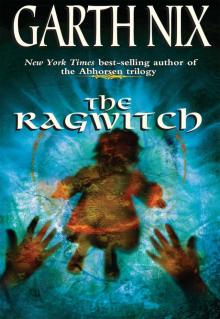 The Ragwitch
The Ragwitch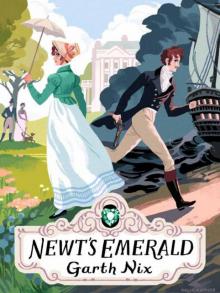 Newt's Emerald
Newt's Emerald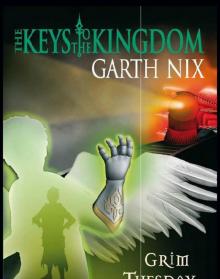 Grim Tuesday
Grim Tuesday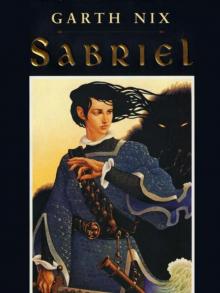 Sabriel
Sabriel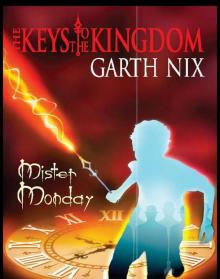 Mister Monday
Mister Monday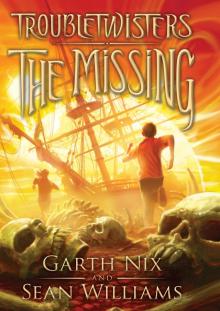 The Missing
The Missing The Fall
The Fall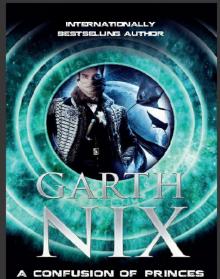 A Confusion of Princes
A Confusion of Princes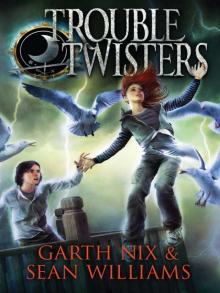 Troubletwisters
Troubletwisters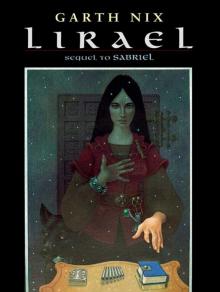 Lirael
Lirael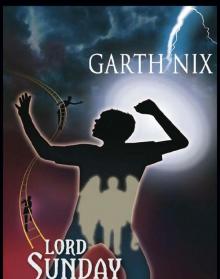 Lord Sunday
Lord Sunday Clariel
Clariel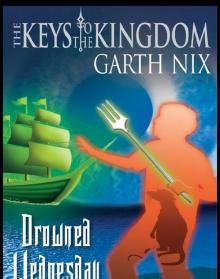 Drowned Wednesday
Drowned Wednesday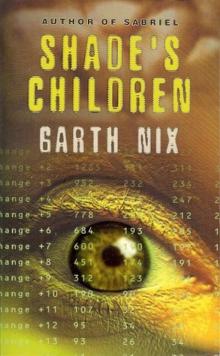 Shade's Children
Shade's Children The Violet Keystone
The Violet Keystone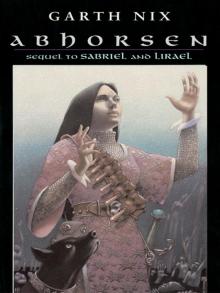 Abhorsen
Abhorsen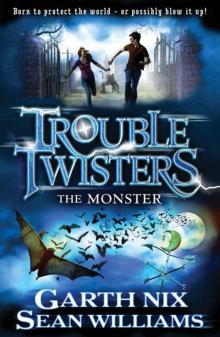 The Monster
The Monster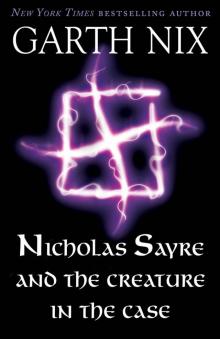 The Creature in the Case
The Creature in the Case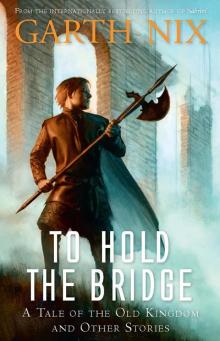 To Hold the Bridge
To Hold the Bridge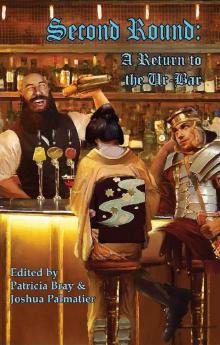 Second Round: A Return to the Ur-Bar
Second Round: A Return to the Ur-Bar Above the Veil
Above the Veil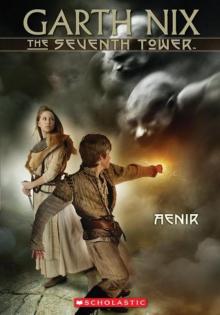 Aenir
Aenir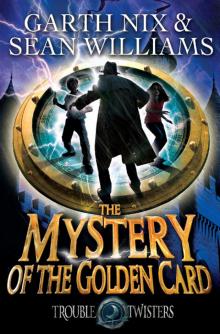 Mystery of the Golden Card
Mystery of the Golden Card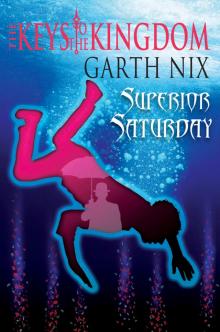 Superior Saturday
Superior Saturday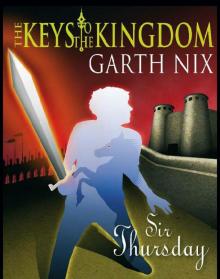 Sir Thursday
Sir Thursday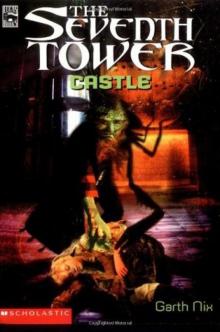 Castle
Castle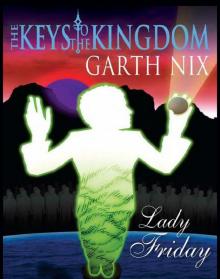 Lady Friday
Lady Friday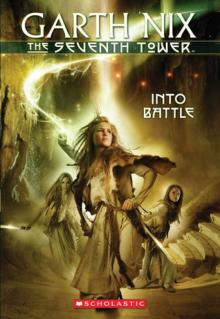 Into Battle
Into Battle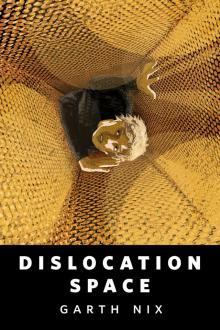 Dislocation Space
Dislocation Space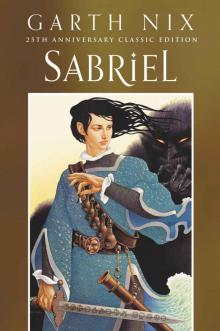 Sabriel (Old Kingdom Book 1)
Sabriel (Old Kingdom Book 1) Sir Hereward and Mister Fitz Go to War Again shamf-1
Sir Hereward and Mister Fitz Go to War Again shamf-1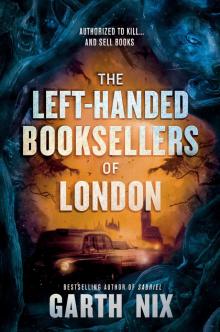 The Left-Handed Booksellers of London
The Left-Handed Booksellers of London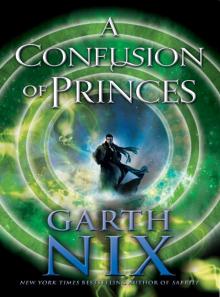 Novel - A Confusion of Princes
Novel - A Confusion of Princes One Beastly Beast
One Beastly Beast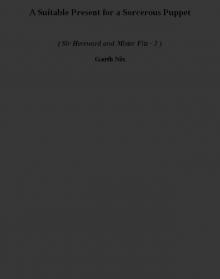 A Suitable Present for a Sorcerous Puppet shamf-3
A Suitable Present for a Sorcerous Puppet shamf-3 Beyond the Sea Gates of the Scholar Pirates of Sarsköe shamf-2
Beyond the Sea Gates of the Scholar Pirates of Sarsköe shamf-2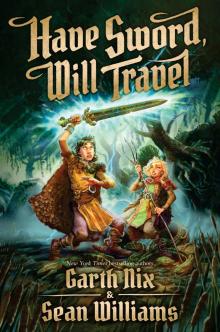 Have Sword, Will Travel
Have Sword, Will Travel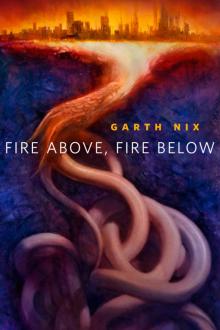 Fire Above, Fire Below
Fire Above, Fire Below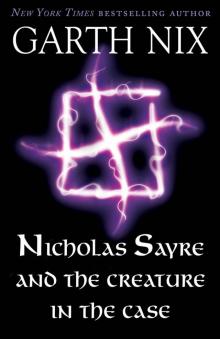 Nicholas Sayre and the Creature in the Case
Nicholas Sayre and the Creature in the Case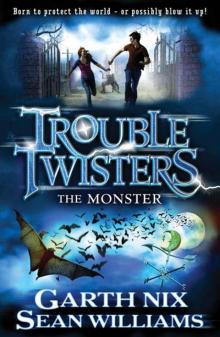 The Monster (Troubletwisters)
The Monster (Troubletwisters)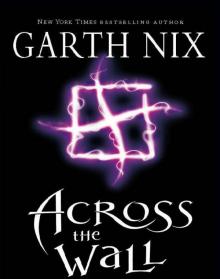 Across the Wall
Across the Wall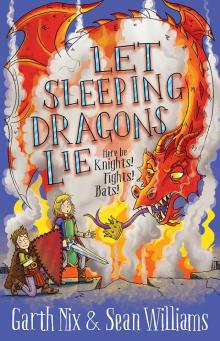 Let Sleeping Dragons Lie
Let Sleeping Dragons Lie![[Abhorsen 03a] - Across the Wall Read online](http://i1.bookreadfree.com/i2/04/12/abhorsen_03a_-_across_the_wall_preview.jpg) [Abhorsen 03a] - Across the Wall
[Abhorsen 03a] - Across the Wall